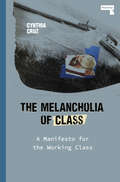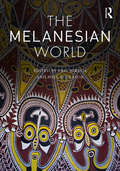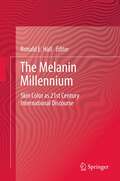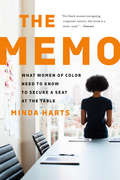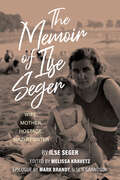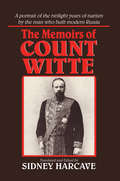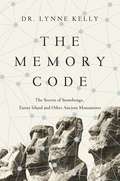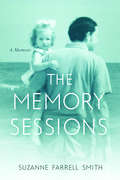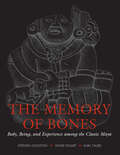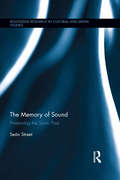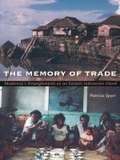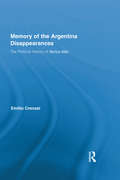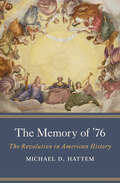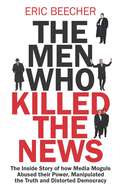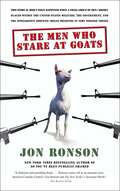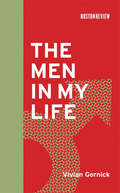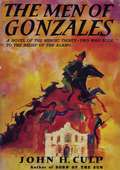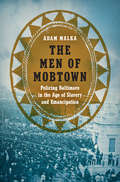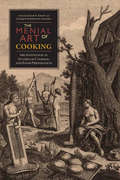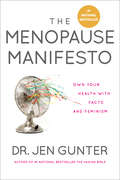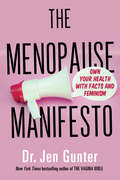- Table View
- List View
The Melancholia of Class: A Manifesto for the Working Class
by Cynthia CruzWhat does it mean to be working-class in a middle-class world? Cynthia Cruz shows us how class affects culture and our mental health and what we can do about it -- calling not for assimilation, but for annihilation.To be working-class in a middle-class world is to be a ghost. Excluded, marginalised, and subjected to violence, the working class is also deemed by those in power to not exist. We are left with a choice between assimilation into middle-class values and culture, leaving our working-class origins behind, or total annihilation.In The Melancholia of Class, Cynthia Cruz analyses how this choice between assimilation or annihilation has played out in the lives of working-class musicians, artists, writers, and filmmakers — including Amy Winehouse, Ian Curtis, Jason Molina, Barbara Loden, and many more — and the resultant Freudian melancholia that ensues when the working-class subject leaves their origins to &“become someone,&” only to find that they lose themselves in the process.Part memoir, part cultural theory, and part polemic, The Melancholia of Class shows us how we can resist assimilation, uplifting and carrying our working-class origins and communities with us, as we break the barriers of the middle-class world. There are so many of us, all of us waiting. If we came together, who knows what we could do.
The Melanesian World (Routledge Worlds)
by Eric Hirsch Will RollasonThis wide-ranging volume captures the diverse range of societies and experiences that form what has come to be known as Melanesia. It covers prehistoric, historic and contemporary issues, and includes work by art historians, political scientists, geographers and anthropologists. The chapters range from studies of subsistence, ritual and ceremonial exchange to accounts of state violence, new media and climate change. The ‘Melanesian world’ assembled here raises questions that cut to the heart of debates in the human sciences today, with profound implications for the ways in which scholars across disciplines can describe and understand human difference. This impressive collection of essays represents a valuable resource for scholars and students alike.
The Melanin Millennium
by Ronald E. HallIn the aftermath of the 60s "Black is Beautiful" movement and publication of The Color Complex almost thirty years later the issue of skin color has mushroomed onto the world stage of social science. Such visibility has inspired publication of the Melanin Millennium for insuring that the discourse on skin color meet the highest standards of accuracy and objective investigation. This volume addresses the issue of skin color in a worldwide context. A virtual visit to countries that have witnessed a huge rise in the use of skin whitening products and facial feature surgeries aiming for a more Caucasian-like appearance will be taken into account. The book also addresses the question of whether using the laws has helped to redress injustices of skin color discrimination, or only further promoted recognition of its divisiveness among people of color and Whites. The Melanin Millennium has to do with now and the future. In the 20th century science including eugenics was given to and dominated by discussions of race category. Heretofore there remain social scientists and other relative to the issue of skin color loyal to race discourse. However in their interpretation and analysis of social phenomena the world has moved on. Thus while race dominated the 20th century the 21st century will emerge as a global community dominated by skin color and making it the melanin millennium.
The Memo: What Women of Color Need to Know to Secure a Seat at the Table
by Minda HartsLean In for women of color: A no-BS look at the odds stacked against women of color in professional settings, from the wage gap to biases and micro-aggressions, with actionable takeawaysThe Memo is the much-needed career advice guide for women of color specifically, finally ending the one-size-fits-all approach of business books that lump together women across races and overlook the unique barriers to success for women of color. In a charismatic and relatable voice, Minda Harts brings her entrepreneurial experience as CEO of The Memo to the page, as well as her past career life as a fundraising consultant to top colleges across the country. With wit and candor, Harts begins by acknowledging the "ugly truths" that keep women of color from getting the proverbial seat at the table in corporate America: micro-aggressions, systemic racism, white privilege, etc. Harts validates that women aren't making up the discrimination they feel, even if it isn't always overt. From there, she gives straight talk on how to address these issues head on, and provides a roadmap to help women of color and their allies make real change to the system. With chapters on network-building, office politics, money and negotiation, The Memo covers all the basics that any good business book should. But through the author's lens, it offers support and long-overdue advice particularly for women of color.
The Memoir of Ilse Seger: Wife, Mother, Hostage, Nazi Resister
by Ilse SegerElisabeth "Ilse" Seger was the wife of Gerhart Heinrich Seger, a German Social Democratic member of the Reichstag from 1930 to 1933. He was reelected for the last time on March 5, 1933, shortly after Hitler came to power. A week later, the Nazis arrested him and held him in "protective custody" for three months in a local prison in Dessau and then sent him to Oranienburg concentration camp for six months, until he escaped to Czechoslovakia. In The Memoir of Ilse Seger, Ilse tells Gerhart's story, but more importantly, she tells her own story: of her early resistance to the Nazi regime as a political opponent herself; of her solidarity with the Jews during the early years of Nazi persecution; of her defiance of expectations for women at the time; of her time as a hostage alongside her daughter, Renate, in Rosslau concentration camp and how they got out with help from members of Parliament; and, lastly, of her first years living in exile in France and Switzerland as her husband went on an anti-fascist speaking tour in the US. Ilse's story is an incredible contribution to our understanding of gendered political resistance, life in early German concentration camps, and Alltagsgeschichte, or the history of everyday life, by showing what everyday life was like for the wife of a political opponent in Nazi Germany.The Memoir of Ilse Seger is a gripping narrative of adventure and intrigue about the wartime life of an ordinary, decent woman.
The Memoirs of Chief Red Fox
by Chief Red FoxAutobiography of the early 20th century performer, actor, and Sioux Indian rights advocate. Nephew of famed Sioux war leader, Crazy Horse.
The Memoirs of Count Witte
by Sidney Harcave Sergei Iu WitteA portrait of the twilight years of Isarism by Count Sergei Witte (1849-1915), the man who built modern Russia. Witte presents incisive and often piquant portraits of the mighty and those around them--powerful Alexander III, the weak-willed Nicholas II, and the neurasthenic Empress Alexandra, along with his own notorious cousin, Madam blavatsky, the "priestess of the occult".
The Memoirs of Fray Servando Teresa De Mier
by Jean FrancoOn December 12, 1794, Fray Servando Teresa de Mier preached a sermon in Mexico City that led to his arrest by the Inquisition. He was exiled to Spain—only to escape and spend ten years traveling throughout Europe, as none other than a French priest. So began the grand adventure of Fray Servando's life, and of this gripping memoir. Here is an invitation hard for any reader to resist: a glimpse of the European "Age of Enlightenment" through the eyes of a fugitive Mexican friar. In this memoir, one sees a portrait of manners and morals that is a far cry from the "civilized" spirit that the Empire wanted to impose on its Colonies. This book takes a look at history from an upside down perspective, asking this question: who were the real savages, the colonizers themselves, or the supposed "savages" they were struggling to convert? After ten years, Fray Servando finally returned home to an independent Mexico, where he served the new government before his death. Heretic and rebel, fugitive and visionary, character in a novel and father of his country--Fray Servando Teresa de Mier was all of these things. Translated into English for the first time, this memoir truly captures the passionate spirit of a fantastic man.
The Memory Code: The Secrets of Stonehenge, Easter Island and Other Ancient Monuments
by Lynne KellyThe discovery of a powerful memory technique used by our Neolithic ancestors in their monumental memory places—and how we can use their secrets to train our own minds In ancient, pre-literate cultures across the globe, tribal elders had encyclopedic memories. They could name all the animals and plants across a landscape, identify the stars in the sky, and recite the history of their people. Yet today, most of us struggle to memorize more than a short poem. Using traditional Aboriginal Australian song lines as a starting point, Dr. Lynne Kelly has since identified the powerful memory technique used by our ancestors and indigenous people around the world. In turn, she has then discovered that this ancient memory technique is the secret purpose behind the great prehistoric monuments like Stonehenge, which have puzzled archaeologists for so long. The henges across northern Europe, the elaborate stone houses of New Mexico, huge animal shapes in Peru, the statues of Easter Island—these all serve as the most effective memory system ever invented by humans. They allowed people in non-literate cultures to memorize the vast amounts of information they needed to survive. But how? For the first time, Dr. Klly unlocks the secret of these monuments and their uses as "memory places" in her fascinating book. Additionally, The Memory Code also explains how we can use this ancient mnemonic technique to train our minds in the tradition of our forbearers.
The Memory Sessions
by Suzanne Farrell SmithSuzanne Farrell Smith’s father was killed by a drunk driver when she was six, and a devastating fire nearly destroyed her house when she was eight. She remembers those two—and only those two—events from her first nearly twelve years of life. While her three older sisters hold on to rich and rewarding memories of their father, Smith recalls nothing of him. Her entire childhood was, seemingly, erased. In The Memory Sessions, Smith attempts to excavate lost childhood memories. She puts herself through multiple therapies and exercises, including psychotherapy, hypnotherapy, somatic experiencing, and acupuncture. She digs for clues in her mother’s long-stored boxes. She creates—with objects, photographs, and captions—a physical timeline to compensate for the one that’s missing in her memory. She travels to San Diego, where her family vacationed with her father right before he died. She researches, interviews, and meditates, all while facing down the two traumatic memories that defined her early life. The result is an experimental memoir that upends our understanding of the genre. Rather than recount a childhood, The Memory Sessions attempts to create one from research, archives, imagination, and the memories of others. Published by Bucknell University Press. Distributed worldwide by Rutgers University Press.
The Memory of Bones: Body, Being, and Experience among the Classic Maya (Joe R. and Teresa Lozano Long Series in Latin American and Latino Art and Culture)
by Karl Taube Stephen D. Houston Stuart DavidAn analysis of the intellectual and emotional life of ancient Mesoamerican people through studies of figural works and inscriptions. All of human experience flows from bodies that feel, express emotion, and think about what such experiences mean. But is it possible for us, embodied as we are in a particular time and place, to know how people of long ago thought about the body and its experiences? In this groundbreaking book, three leading experts on the Classic Maya (ca. AD 250 to 850) marshal a vast array of evidence from Maya iconography and hieroglyphic writing, as well as archaeological findings, to argue that the Classic Maya developed an approach to the human body that we can recover and understand today. Starting with a cartography of the Maya body as depicted in imagery and texts, the authors explore how the body was replicated in portraiture; how it experienced the world through ingestion, the senses, and the emotions; how the body experienced war and sacrifice and the pain and sexuality; how words, often heaven-sent, could be embodied; and how bodies could be blurred through spirit possession. From these investigations, the authors convincingly demonstrate that the Maya conceptualized the body in varying roles, as a metaphor of time, as a gendered, sexualized being, in distinct stages of life, as an instrument of honor and dishonor, as a vehicle for communication and consumption, as an exemplification of beauty and ugliness, and as a dancer and song-maker. Their findings open a new avenue for empathetically understanding the ancient Maya as living human beings who experienced the world as we do, through the body.
The Memory of Fire Trilogy: Genesis, Faces and Masks, and Century of the Wind (Memory of Fire)
by Eduardo GaleanoAll three books in the American Book Award–winning Memory of Fire Trilogy available in a single volume for the first time. Eduardo Galeano&’s Memory of Fire Trilogy defies categorization—or perhaps creates its own. It is a passionate, razor-sharp, lyrical history of North and South America, from the birth of the continent&’s indigenous peoples through the end of the twentieth century. The three volumes form a haunting and dizzying whole that resurrects the lives of Indians, conquistadors, slaves, revolutionaries, poets, and more. The first book, Genesis, pays homage to the many origin stories of the tribes of the Americas, and paints a verdant portrait of life in the New World through the age of the conquistadors. The second book, Faces and Masks, spans the two centuries between the years 1700 and 1900, in which colonial powers plundered their newfound territories, ultimately giving way to a rising tide of dictators. And in the final installment, Century of the Wind, Galeano brings his story into the twentieth century, in which a fractured continent enters the modern age as popular revolts blaze from North to South. This celebrated series is a landmark of contemporary Latin American writing, and a brilliant document of culture.
The Memory of Sound: Preserving the Sonic Past (Routledge Research in Cultural and Media Studies)
by Seán StreetThis book explores the connections between sound and memory across all electronic media, with a particular focus on radio. Street explores our capacity to remember through sound and how we can help ourselves preserve a sense of self through the continuity of memory. In so doing, he analyzes how the brain is triggered by the memory of programs, songs, and individual sounds. He then examines the growing importance of sound archives, community radio and current research using GPS technology for the history of place, as well as the potential for developing strategies to aid Alzheimer's and dementia patients through audio memory.
The Memory of Trade: Modernity’s Entanglements on an Eastern Indonesian Island
by Patricia SpyerThe Memory of Trade is an ethnographic study of the people of Aru, an archipelago in eastern Indonesia. Central to Patricia Spyer's study is the fraught identification of Aruese people with two imaginary elsewheres--the 'Aru' and the 'Malay'--and the fissured construction of community that has ensued from centuries of active international trade and more recent encroachments of modernity. Drawing on more than two years of archival and ethnographic research, Spyer examines the dynamics of contact with the Dutch and Europeans, Suharto's postcolonial regime, and with the competing religions of Islam, Protestantism, and Catholicism in the context of the recent conversion of pagan Aruese. While arguing that Aru identity and community are defined largely in terms of absence, longing, memory, and desire, she also incorporates present-day realities--such as the ecological destruction wrought by the Aru trade in such luxury goods as pearls and shark fins--without overlooking the mystique and ritual surrounding these activities. Imprinted on the one hand by the archipelago's long engagement with extended networks of commerce and communication and, on the other, by modernity's characteristic repressions and displacements, Aruese make and manage their lives somewhat precariously within what they often seem to construe as a dangerously expanding--if still enticing--world. By documenting not only the particular expectations and strategies Aruese have developed in dealing with this larger world but also the price they pay for participation therein, The Memory of Trade speaks to problems commonly faced elsewhere in the frontier spaces of modern nation-states. Balancing particularly astute analysis with classic ethnography, The Memory of Trade will appeal not only to anthropologists and historians but also to students and specialists of Southeast Asia, modernity, and globalization.
The Memory of the Argentina Disappearances: The Political History of Nunca Mas
by Emilio CrenzelMemory of the Argentina Disappearances examines the history of the production, public circulation, and the interpretations and reinterpretations of the Nunca Más report issued by Argentina’s National Commission on the Disappearance of Persons (CONADEP). It was established in 1983 by constitutional president Raúl Alfonsín to investigate the fate of thousands of people who had been disappeared by the state during the seventies. Upon publication in 1984, Nunca Más became a bestseller, was translated into several languages and won greater public importance when the military juntas were brought to trial and the court accepted the report as key evidence. The report’s importance was further enhanced with the adoption of CONADEP and Nunca Más as models for truth commissions established in Latin America, and when it was postulated as a means for conveying an awareness of this past to Argentina’s younger generations. This book contributes to understanding the political processes that led to Nunca Más becoming the way in which Argentines remembered the disappearances and the country’s political violence, and how its meaning is modified by new interpretations. Given the canonical nature of Nunca Más, the book sheds light on the most substantial changes and the continuities in Argentina’s social memory of its recent past.
The Memory of ’76: The Revolution in American History
by Michael D. HattemThe surprising history of how Americans have fought over the meaning and legacy of the Revolution for nearly two and a half centuries Americans agree that their nation&’s origins lie in the Revolution, but they have never agreed on what the Revolution meant. For nearly two hundred and fifty years, politicians, political parties, social movements, and a diverse array of ordinary Americans have constantly reimagined the Revolution to fit the times and suit their own agendas. In this sweeping take on American history, Michael D. Hattem reveals how conflicts over the meaning and legacy of the Revolution—including the Declaration of Independence and the Constitution—have influenced the most important events and tumultuous periods in the nation&’s history; how African Americans, women, and other oppressed groups have shaped the popular memory of the Revolution; and how much of our contemporary memory of the Revolution is a product of the Cold War. By exploring the Revolution&’s unique role in American history as a national origin myth, Hattem shows how the meaning of the Revolution has never been fixed, how remembering the nation&’s founding has often done far more to divide Americans than to unite them, and how revising the past is an important and long‑standing American political tradition.
The Men Who Killed the News: The inside story of how media moguls abused their power, manipulated the truth and distorted democracy
by Eric BeecherCrikey owner and ex-News Corp and Fairfax editor lifts the lid on the abuse of power by media moguls – from William Randolph Hearst to Elon Musk – and on his own unique experience of working for (and being sued by) the Murdochs. What&’s gone wrong with our media? The answer: its owners. From William Randolph Hearst to Elon Musk, from the British press barons to colonial upstarts Conrad Black and Rupert Murdoch, media proprietors have manipulated the news to accumulate wealth and influence as they meddled with democracy. Eric Beecher knows the news business from bottom to top. He has been a journalist, editor and media proprietor (of Text Media and Crikey), with the rare distinction of having both worked for and been sued (unsuccessfully) by the Murdochs. This book reveals the distorted role of the media moguls of the past two centuries: their techniques, strategies, behind-closed-doors machinations, and indulgent lifestyles. It explains how they have exploited the shield of the freedom of the press to undermine journalism – and truth. In an era of fake news, AI and misinformation, this is democracy&’s chillingly important story: how a small coterie of flawed and narcissistic moguls created a shadow of power that has contributed to making the media an agent of mistrust.
The Men Who Stare at Goats
by Jon RonsonBizarre military history: In 1979, a crack commando unit was established by the most gifted minds within the U.S. Army. Defying all known laws of physics and accepted military practice, they believed that a soldier could adopt the cloak of invisibility, pass cleanly through walls, and--perhaps most chillingly--kill goats just by staring at them. They were the First Earth Battalion, entrusted with defending America from all known adversaries. And they really weren't joking. What's more, they're back--and they're fighting the War on Terror. An uproarious exploration of American military paranoia: With investigations ranging from the mysterious "Goat Lab," to Uri Geller's covert psychic work with the CIA, to the increasingly bizarre role played by a succession of U.S. presidents, this might just be the funniest, most unsettling book you will ever read--if only because it is all true and is still happening today.
The Men in My Life (Boston Review Books)
by Vivian GornickGornick on V. S. Naipaul, James Baldwin, George Gissing, Randall Jarrell, H. G. Wells, Loren Eiseley, Allen Ginsberg, Hayden Carruth, Saul Bellow, and Philip Roth and the intimate relationship between emotional damage and great literature.Vivian Gornick, one of our finest critics, tackled the theme of love and marriage in her last collection of essays, The End of the Novel of Love, a National Book Critics Circle Award finalist. In this new collection, she turns her attention to another large theme in literature: the struggle for the semblance of inner freedom. Great literature, she believes, is not the record of the achievement, but of the effort.Gornick, who emerged as a major writer during the second-wave feminist movement, came to realize that “ideology alone could not purge one of the pathological self-doubt that seemed every woman's bitter birthright.” Or, as Anton Chekhov put it so memorably: “Others made me a slave, but I must squeeze the slave out of myself, drop by drop.” Perhaps surprisingly, Gornick found particular inspiration for this challenge in the work of male writers—talented, but locked in perpetual rage, self-doubt, or social exile. From these men—who had infinitely more permission to do and be than women had ever known—she learned what it really meant to wrestle with demons. In the essays collected here, she explores the work of V. S. Naipaul, James Baldwin, George Gissing, Randall Jarrell, H. G. Wells, Loren Eiseley, Allen Ginsberg, Hayden Carruth, Saul Bellow, and Philip Roth. Throughout the book, Gornick is at her best: interpreting the intimate interrelationship of emotional damage, social history, and great literature.
The Men of Gonzales
by John H. CulpThis 1960 novel by acclaimed author John H. Culp, author of Born of the Sun and The Restless Land, tells the tale of the heroic thirty-two men, guided by Texan political figure John W. Smith, who rode to the relief of the Alamo on March 1, 1836. At dawn on this day, Capt. Albert Martin, with 32 men (himself included) from Gonzales and DeWitt's Colony, passed the lines of Santa Anna and entered the walls of the Alamo, never more to leave them. These men, chiefly husbands and fathers, owning their own homes, voluntarily organized and passed through the lines of an enemy four to six thousand strong, to join 150 of their countrymen and neighbors, in a fortress doomed to destruction. A gripping read.
The Men of Mobtown: Policing Baltimore in the Age of Slavery and Emancipation (Justice, Power, and Politics)
by Adam MalkaWhat if racialized mass incarceration is not a perversion of our criminal justice system's liberal ideals, but rather a natural conclusion? Adam Malka raises this disturbing possibility through a gripping look at the origins of modern policing in the influential hub of Baltimore during and after slavery's final decades. He argues that America's new professional police forces and prisons were developed to expand, not curb, the reach of white vigilantes, and are best understood as a uniformed wing of the gangs that controlled free black people by branding them—and treating them—as criminals. The post–Civil War triumph of liberal ideals thus also marked a triumph of an institutionalized belief in black criminality.Mass incarceration may be a recent phenomenon, but the problems that undergird the "new Jim Crow" are very, very old. As Malka makes clear, a real reckoning with this national calamity requires not easy reforms but a deeper, more radical effort to overcome the racial legacies encoded into the very DNA of our police institutions.
The Menial Art of Cooking: Archaeological Studies of Cooking and Food Preparation
by Sarah R. Graff Enrique Rodríguez-AlegríaAlthough the archaeology of food has long played an integral role in our understanding of past cultures, the archaeology of cooking is rarely integrated into models of the past. The cooks who spent countless hours cooking and processing food are overlooked and the forgotten players in the daily lives of our ancestors. The Menial Art of Cooking shows how cooking activities provide a window into other aspects of society and, as such, should be taken seriously as an aspect of social, cultural, political, and economic life. This book examines techniques and technologies of food preparation, the spaces where food was cooked, the relationship between cooking and changes in suprahousehold economies, the religious and symbolic aspects of cooking, the relationship between cooking and social identity, and how examining foodways provides insight into social relations of production, distribution, and consumption. Contributors use a wide variety of evidence--including archaeological data; archival research; analysis of ceramics, fauna, botany, glass artifacts, stone tools, murals, and painted ceramics; ethnographic analogy; and the distribution of artifacts across space--to identify evidence of cooking and food processing left by ancient cooks. The Menial Art of Cooking is the first archaeological volume focused on cooking and food preparation in prehistoric and historic settings around the world and will interest archaeologists, social anthropologists, sociologists, and other scholars studying cooking and food preparation or subsistence.
The Menial Art of Cooking: Archaeological Studies of Cooking and Food Preparation
by Sarah R. Graff Enrique Rodrïguez-AlegrïaAlthough the archaeology of food has long played an integral role in our understanding of past cultures, the archaeology of cooking is rarely integrated into models of the past. The cooks who spent countless hours cooking and processing food are overlooked and the forgotten players in the daily lives of our ancestors. The Menial Art of Cooking shows how cooking activities provide a window into other aspects of society and, as such, should be taken seriously as an aspect of social, cultural, political, and economic life. This book examines techniques and technologies of food preparation, the spaces where food was cooked, the relationship between cooking and changes in suprahousehold economies, the religious and symbolic aspects of cooking, the relationship between cooking and social identity, and how examining foodways provides insight into social relations of production, distribution, and consumption. Contributors use a wide variety of evidence-including archaeological data; archival research; analysis of ceramics, fauna, botany, glass artifacts, stone tools, murals, and painted ceramics; ethnographic analogy; and the distribution of artifacts across space-to identify signs of cooking and food processing left by ancient cooks. The Menial Art of Cooking is the first archaeological volume focused on cooking and food preparation in prehistoric and historic settings around the world and will interest archaeologists, social anthropologists, sociologists, and other scholars studying cooking and food preparation or subsistence.
The Menopause Manifesto: Own Your Health with Facts and Feminism
by Dr. Jen GunterIn her follow-up to the #1 bestseller The Vagina Bible, Dr. Jen Gunter, Canadian OB/GYN and the internet's most fearless advocate for women's health, brings us empowerment through knowledge by countering stubborn myths and misunderstandings about menopause with hard facts, real science, fascinating historical perspective, and expert advice.The only thing predictable about menopause is its unpredictability. Factor in widespread misinformation, a lack of research, and the culture of shame around women's bodies, and it's no wonder women are unsure what to expect during the menopause transition and beyond. Menopause is not a disease--it's a planned change, like puberty. And just like puberty, we should be educated on what's to come years in advance, rather than the current practice of leaving people on their own with bothersome symptoms and too much conflicting information. Knowing what is happening, why, and what to do about it is both empowering and reassuring. Frank and funny, Dr. Jen debunks misogynistic attitudes and challenges the over-mystification of menopause to reveal everything you really need to know about:* Perimenopause * Hot flashes * Sleep disruption * Sex and libido * Depression and mood changes * Skin and hair issues * Outdated therapies * Breast health * Weight and muscle mass * Health maintenance screening * And much more! Filled with practical tips, useful information and startling insights, this essential guide will revolutionize how women experience menopause--and show them how their lives can be even better for it.
The Menopause Manifesto: Own Your Health with Facts and Feminism
by Dr. Jen GunterAn Instant New York Times, Washington Post, USA Today, San Francisco Chronicle, and Publishers Weekly Bestseller!A Next Avenue Influencer in Aging 2021#1 Canadian Bestseller Just as she did in her groundbreaking bestseller The Vagina Bible, Dr. Jen Gunter, the internet&’s most fearless advocate for women&’s health, brings you empowerment through knowledge by countering stubborn myths and misunderstandings about menopause with hard facts, real science, fascinating historical perspective, and expert advice. "I feel more equipped to care for my patients, challenge the patriarchy, and empower & educate thanks to her work and advocacy.&” —Dr. Danielle Jones (Mama Doctor Jones) &“An exhilarating read and a comprehensive review of all things menopause.&” —North American Menopause Society&“Gynecologist Gunter (The Vagina Bible) helps women navigate the ins and outs of menopause in this delightfully conversational and strongly feminist guide. Readers looking to separate menopausal fact from fiction should take note.&” —Publishers Weekly&“Gunter mixes sound medical information with a bit of humor and a lot of candor…[this] frank and expert guide provides an informative and reassuring look at a long, often baffling and infuriating phase of life.&” —Booklist The only thing predictable about menopause is its unpredictability. Factor in widespread misinformation, a lack of research, and the culture of shame around women&’s bodies, and it&’s no wonder women are unsure what to expect during the menopause transition and beyond. Menopause is not a disease—it&’s a planned change, like puberty. And just like puberty, we should be educated on what&’s to come years in advance, rather than the current practice of leaving people on their own with bothersome symptoms and too much conflicting information. Knowing what is happening, why, and what to do about it is both empowering and reassuring. Frank and funny, Dr. Jen debunks misogynistic attitudes and challenges the over-mystification of menopause to reveal everything you really need to know about: *Perimenopause * Hot flashes * Sleep disruption * Sex and libido * Depression and mood changes * Skin and hair issues * Outdated therapies * Breast health * Weight and muscle mass * Health maintenance screening * And much more! Filled with practical, reassuring information, this essential guide will revolutionize how women experience menopause—including how their lives can be even better for it!&“Read this book immediately.&” —New York Times bestseller Ayelet Waldman, author of A Really Good Day and Love & Treasure&“This is the new &‘it&’ book for women who want to prepare for or understand what menopause is (and isn't).&” —Dr. Jennifer Lincoln
